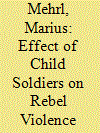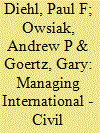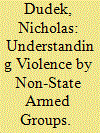| Srl | Item |
| 1 |
ID:
182564


|
|
|
|
|
| Summary/Abstract |
Existing work describes child soldiers as very violent towards civilians. Challenging this, I posit that children’s effect on group behaviour is conditioned by rebels’ civilian support. Because they have weak pre-existing norms, children are both prone to normalize violence and susceptible to rebel efforts to control their use of violence. They should thus closely follow group rules in their behaviour towards civilians, implying a moderating effect of these rules. I expect that child soldiering increases civilian victimization only for groups who lack incentives to show restraint towards civilians because they receive no support from them. Empirical tests support this expectation.
|
|
|
|
|
|
|
|
|
|
|
|
|
|
|
|
| 2 |
ID:
182561


|
|
|
|
|
| Summary/Abstract |
This study examines international-civil militarized conflicts (I-CMCs), those that lie at the intersection of violent intra- and interstate conflict. The data compilation identifies I-CMCs and the different conflict management approaches specifically used to manage them (i.e., negotiation, mediation, legal, peacekeeping, sanctions, and military intervention). We describe the patterns of conflict management in I-CMCs over the period 1946–2010, with respect to both serious civil and interstate conflicts. Among the key findings are that conflict management in general is very frequent (about 18 attempts per interstate confrontation and much more for serious internal conflict) and mediation is by far the most frequent approach.
|
|
|
|
|
|
|
|
|
|
|
|
|
|
|
|
| 3 |
ID:
182563


|
|
|
|
|
| Summary/Abstract |
The experiences of irregular combatants and the psychosocial impact of their participation in violent conflict are poorly understood in comparison to the body of research available on military veterans in developed countries. The Lebanese civil war (1975–1990) was an archetypal intra-national armed conflict, involving thousands of civilians turned fighters. Fifteen former fighters were interviewed about their active involvement in the war. The qualitative analysis reveals a persistent psychosocial burden decades later. Former paramilitary fighters have needs that overlap only partially with those of regular veterans. Further research on this population would be beneficial to global peacebuilding efforts and conflict prevention.
|
|
|
|
|
|
|
|
|
|
|
|
|
|
|
|
| 4 |
ID:
182560


|
|
|
|
|
| Summary/Abstract |
Rebels groups adopt different organisational structures, emerging in various shapes and sizes. Some rebel groups construct distinct military and political wings, delegating their military and political operations to specialised units. While recent studies have made great strides towards understanding militant groups’ activities on and off the battlefield, the literature has been less attentive to the root causes of the structural arrangements which groups form for these purposes. I argue that rebel leaders’ pre-war military and political experiences shape the structure of the organisations they lead into war. Using original data, I find that differences in leaders’ pre-war military experience, rather than political experience, are associated with discernible probabilities of rebel operational specialisation. In addition to offering practitioners and academics a comparative framework with which to evaluate the patterns of militant leadership, this study demonstrates how leaders wield independent agency over group structure and operations in the civil war environment.
|
|
|
|
|
|
|
|
|
|
|
|
|
|
|
|
| 5 |
ID:
182565


|
|
|
|
|
| Summary/Abstract |
Existing research on the relationship between alcohol and conflict has focused on displaced populations and viewed alcohol largely as a driver of post-war social problems such as trauma and violence. We draw on qualitative research in Sri Lanka and Nepal to build a more complex picture of alcohol’s role in post-war societies that is attuned to its political economy dimensions and its politically symbolic role. This article develops a comparative and multi-disciplinary approach to demonstrate how narratives about alcohol can reinforce existing processes of social marginalisation and how alcohol can play an important symbolic role in post-war politics.
|
|
|
|
|
|
|
|
|
|
|
|
|
|
|
|
| 6 |
ID:
182562


|
|
|
|
|
| Summary/Abstract |
This paper uses a case study of Sierra Leone’s Revolutionary United Front to help explain when and where non-state armed groups (NSAGs) use violence, and what type of violence such groups use. The first part of the paper compares ‘ideological’ and ‘instrumental’ theories and finds strong support for ‘instrumental’ explanations, particularly contestation theory. The second part of the paper seeks to explain the patterns of contestation, which the existing scholarship treats as an independent variable, and finds that the patterns of contestation are explained by the interaction of the state and NSAG’s policy goals.
|
|
|
|
|
|
|
|
|
|
|
|
|
|
|
|